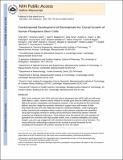Combinatorial Development of Biomaterials for Clonal Growth of Human Pluripotent Stem Cells
Author(s)
Mei, Ying; Saha, Krishanu; Bogatyrev, Said R.; Yang, Jing; Hook, Andrew L.; Kalcioglu, Zeynep Ilke; Cho, Seung Woo; Mitalipova, Maisam; Pyzocha, Neena; Rojas, Fredrick P.; Van Vliet, Krystyn J.; Davies, Martyn C.; Alexander, Morgan R.; Langer, Robert; Jaenisch, Rudolf; Anderson, Daniel G.; ... Show more Show less
DownloadJaenisch_Combinatorial development.pdf (2.008Mb)
PUBLISHER_POLICY
Publisher Policy
Article is made available in accordance with the publisher's policy and may be subject to US copyright law. Please refer to the publisher's site for terms of use.
Terms of use
Metadata
Show full item recordAbstract
Both human embryonic stem cells and induced pluripotent stem cells can self-renew indefinitely in culture; however, present methods to clonally grow them are inefficient and poorly defined for genetic manipulation and therapeutic purposes. Here we develop the first chemically defined, xeno-free, feeder-free synthetic substrates to support robust self-renewal of fully dissociated human embryonic stem and induced pluripotent stem cells. Material properties including wettability, surface topography, surface chemistry and indentation elastic modulus of all polymeric substrates were quantified using high-throughput methods to develop structure–function relationships between material properties and biological performance. These analyses show that optimal human embryonic stem cell substrates are generated from monomers with high acrylate content, have a moderate wettability and employ integrin α[subscript v]β[subscript 3] and α[subscript v]β[subscript 5] engagement with adsorbed vitronectin to promote colony formation. The structure–function methodology employed herein provides a general framework for the combinatorial development of synthetic substrates for stem cell culture.
Description
July 3, 2012
Date issued
2010-08Department
Harvard University--MIT Division of Health Sciences and Technology; Massachusetts Institute of Technology. Department of Biology; Massachusetts Institute of Technology. Department of Chemical Engineering; Massachusetts Institute of Technology. Department of Materials Science and Engineering; Koch Institute for Integrative Cancer Research at MITJournal
Nature Materials
Publisher
Nature Publishing Group
Citation
Mei, Ying et al. “Combinatorial Development of Biomaterials for Clonal Growth of Human Pluripotent Stem Cells.” Nature Materials 9.9 (2010): 768–778.
Version: Author's final manuscript
ISSN
1476-1122
1476-4660